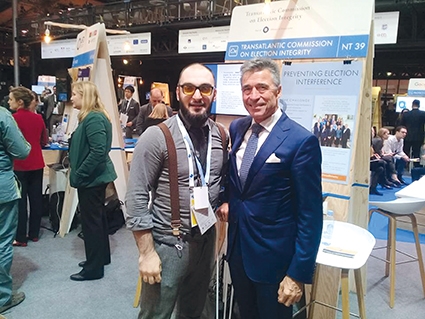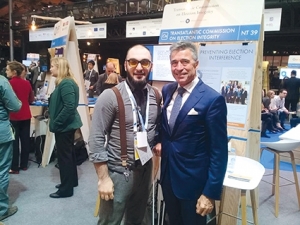Former NATO Head Rasmussen on Giving Putin the Wrong Signals
EXCLUSIVE INTERVIEW
NATO erred in not immediately granting Georgia and Ukraine a Membership Action Plan (MAP) in April 2008, says the former head of the Alliance. Anders Fogh Rasmussen, who served as Secretary General between 2009 and 2014, told us in an exclusive interview for the Institute for War and Peace Reporting that this failure had sent “the wrong signal” to Russian President Vladimir Putin and may have contributed to the decision to attack Georgia in August of the same year. It later became clear, Rasmussen continued, that Putin would see any concessions as weakness, which meant Russia had become a “strategic adversary” rather than a partner.
What could have been done better?
In general, I think we did the right things. We took the opportunity after the collapse of communism and the fall of the Berlin Wall to try to include our Eastern partners both in the EU and NATO; that was the right thing to do and we enlarged both NATO and the European Union. Then, in 2008, at the NATO summit in Bucharest, we also decided that Georgia and Ukraine would become members of NATO. I think that was also the right thing to do. Personally, I was in favor of granting a MAP to Georgia and Ukraine then and there. I think we should have done that and by not doing that, we sent the wrong signal to Putin, who thought he could then act aggressively, and he did so that same year, in August 2008 attacking Georgia. So, in retrospect, I think we should have pursued that path to give a membership action plan to both Georgia and Ukraine. That wouldn't [have been] a guarantee of membership, but it would have sent a powerful signal.
Your predecessor, Jaap De Hoop Scheffer, recently stated that NATO crossed a red line in relation to Russia in Bucharest, and that Putin's reaction was understandable.
To be honest, I haven't seen that interview. What I believe is that we should base our policies on the fundamental principle that each and every nation, including Georgia and Ukraine, have an inherent right to decide their alliance and affiliation themselves on a sovereign basis and that's why we had to live up to the ambitions of Georgia and Ukraine at that time. They requested a MAP and they got a NATO-Georgia commission. It's not for Moscow to decide, it’s not for Brussels to decide; it’s for Tbilisi and Kyiv to decide.
For more than a decade now, Georgia has been trying and failing to step through the proverbial open door to NATO.
If Georgia and Ukraine clearly want to become members of NATO and the European Union, we should allow that process to start; we shouldn't be saying no. Whether they fulfill the necessary criteria remains to be seen, and at the end of the day, it’s of course a common decision, but I don't think in advance we should say, ‘No, you will stay alliance-free or as a neutral space between Russia and NATO.’ We cannot accept that approach.
What do you think of the theories resurfacing that Georgia and Ukraine should become neutral or non-aligned states?
I think that is for Georgia and Ukraine to decide. If Georgia decides to apply for membership or to work towards membership of NATO, then NATO should allow that process. And, of course, it's not only Georgia who can decide at the end of day whether Georgia can become a member, and we have very clear criteria in the NATO treaty: we say membership should be open to all European countries that live up to democratic standards and can contribute to the improvement of Euro-Atlantic security. Georgia at this stage has fulfilled two of the three criteria, the third is whether Georgia will contribute to an improvement of overall security; that's of course a discussion which also relates to the destiny of Abkhazia and Ossetia. But again, that issue should be solved in the dialogue between Georgia and NATO as is not for Moscow to decide.
Have any Georgian officials suggested they might give up the breakaway regions if NATO lets Georgia in?
I'm not going to comment on internal discussions with the Georgian authorities. It's for Georgia to decide whether that might be a solution. There will be no pressure from our side concerning the two regions. From an international law perspective, they are still part of Georgia.
In 2009, you were very optimistic about recharging the relationship with Russia. What happened to those plans?
We thought that we could turn Russia into what we call a strategic partner, and you might recall we had a NATO-Russia summit back in 2010 in which we decided to develop a strategic partnership. But today we have to realize that Russia is not a strategic partner: it is a strategic adversary. It's as simple as that, so we have to adapt to it. I'm not that optimistic anymore, but based on my knowledge about President Putin’s psychology, I see the only way to get him to understand that he needs to engage constructively, in a cooperative spirit, is to maintain a very firm stance and transatlantic unity, because as much as he wants to cultivate the image of himself as a strongman, he respects other strongmen. That's why we should act and not give concessions because he will consider any concession [to be] a weakness.
Had NATO and the West imposed sanctions on Russia back in 2008, could you have reined them in? One example: Russia pulled out of the International Criminal Court investigation into the 2008 war without any repercussions whatsoever.
Well, today we have seen that they repeat themselves - I mean what they've done, their bad behavior in Ukraine. Seen retrospectively, you might argue that had we known that, we might have reacted more harshly, more resolutely, in 2008, but we decided to give it another chance. When I took office, one of my three main priorities was to develop this stronger partnership with Russia. We thought it was possible, but Ukraine showed it was not. And finally, let me tell you this - very recently I went through my notes from the 2008 summit. I saw in my notes that Putin made statements regarding Crimea that are very similar to what he later did publicly. So, had we known that and had we taken him seriously, surely we might have reacted differently. But, still, I would argue we did the right thing - we gave them a chance.
By Vazha Tavberidze












